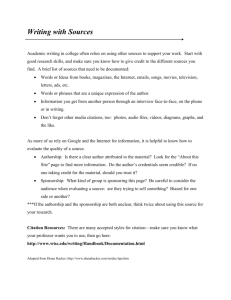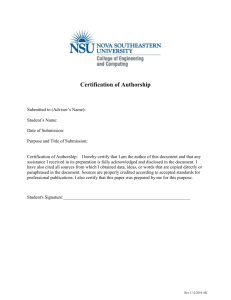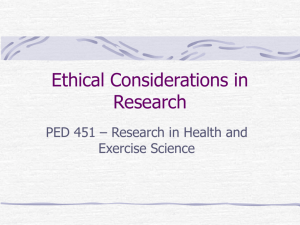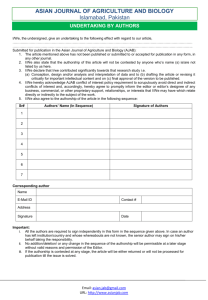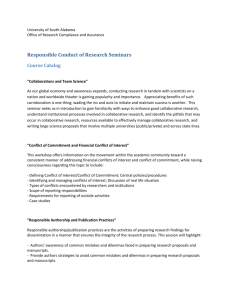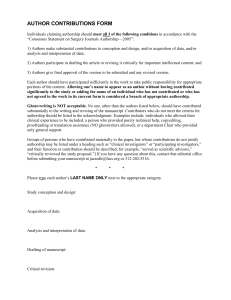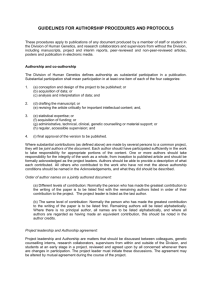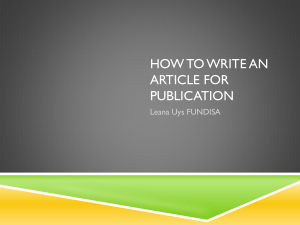Responsible Conduct of Research
advertisement
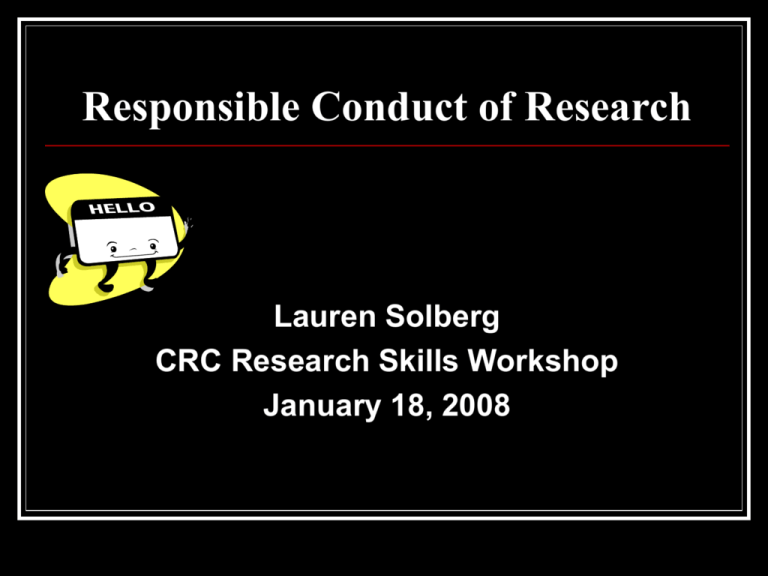
Responsible Conduct of Research Lauren Solberg CRC Research Skills Workshop January 18, 2008 Office of Research Integrity (ORI) http://ori.dhhs.gov Oversees PHS research integrity activities on behalf of Secretary for HHS 1 exception – FDA oversees their own regulatory research activities 2000 – PHS initiated requirement that all PHS-funded research staff undergo RCR education ORI Emphasis on RCR Data Acquisition, Management, Sharing and Ownership Conflict of Interest and Commitment Human Subjects Animal Welfare Research Misconduct Publication Practices and Responsible Authorship Mentor / Trainee Responsibilities Peer Review Collaborative Science Research Misconduct As defined by Office of Research Integrity Fabrication, falsification, plagiarism, or other practices that seriously deviate from those that are commonly accepted in the scientific community for proposing, conducting, or reporting research Not honest error or honest differences in opinion Research Misconduct Statistics Reported in December 2007 ORI newsletter Between 1992 and 2001, 248 different research institutions reported instances of research misconduct 145 (58%) reported misconduct in only 1 year of the 10-year period Fabrication Intentionally creating records that do not exist and for which there is no truth with the intent to mislead or deceive Interviewer completing a questionnaire for a fictitious subject that was never interviewed Preparing records for follow-up calls or contacts to subjects who were really lost to follow-up Creating notes for a subject visit that never took place Eric Poehlman, PhD UVM College of Medicine – fabricated data in 17 grant applications for federal funding as well as in journal articles Barred for life from receiving any federal funds for research – plead guilty to fraud –sentenced in 6/06 to a year and one day in prison Letters of retraction published Also see NY Times article “An Unwelcome Discovery” (10/22/06) Research Staff – Held to the Same Standard Jessica Grol, Research Project Coordinator at University of Pittsburgh – 11/05 Fabricated study research records for 15 subjects, including interview data – research funded by NIH For 3 years – debarred from contracting or subcontracting w/ any US Gov’t agency Falsification Alteration of data collected in the conduct of scientific investigation Omission/deletion/suppression of conflicting data without scientific justification Back-dating interviews to fit within the timeline provided in protocol Changing a subject’s age in data records by an unimportant amount to fit enrollment criteria Craig Gelband, Ph.D. Published in 11/03 Federal Register Falsified data in different manuscripts or publications citing NIH support and NIH grant applications 10-year Voluntary Exclusion Agreement 2 papers retracted, 1 paper withdrawn, figures retracted from 3 papers Joy Bryant and Diana Layman Published in 7/07 Federal Register Phlebotomists at University of Oklahoma Health Sciences Center Falsified research in study by substituting their own blood for the 10-15 blood samples of child study participants as required by the protocol Entered into Voluntary Exclusion Agreement for 3 years Kristin Roovers, Ph.D. Published in Federal Register in 7/07 University of Pennsylvania researcher Falsified data by duplicating and reusing data to misrepresent results as data from different experiments ORI Action: For 5 years – cannot contract or subcontract w/ U.S. government agency or serve in any advisory capacity to PHS Andrew Friedman, MD Brigham and Women’s Hospital physician Between 1992 and 1995, altered and fabricated data in permanent medical records Also falsified and fabricated research data in 80% of his publications (retractions published) 1996 - 3 year Voluntary Exclusion Agreement; for 2 years following 3-year period, employer must submit a plan detailing how he will be supervised for any PHS proposals Now researcher at Ortho-Mcneil Pharmaceutical Plagiarism Intentional use of someone else’s words, thoughts, or ideas, as though they are your own Also includes “self-plagiarism” – author using his/her own published material in another work without citation Ralph Highshaw, MD Urology Fellow from MD Anderson Cancer Center Plagiarized 9 pages of a 21-page article on prevention of urologic cancer – 1/06 For next 3 years – required to certify in all work that all contributors are properly cited – and institution must certify that all work is original, valid, and accurately reported Ali Sultan, MD, PhD From Harvard School of Public Health Plagiarized text and figures from emails from his post-doctoral student Also falsified results of research, and fabricated parts of emails from the student to falsely implicate the student For 3 years – debarred from contracting or subcontracting w/ any US Gov’t agency Categories of Research Misconduct at Vanderbilt Falsification, fabrication, or theft of data or samples Plagiarism Unauthorized use of privileged information Abuse of authorship Significant failure to comply with federal, state, or University rules regarding research If Scientific Misconduct is Reported… See Vanderbilt’s Internal Policy on Scientific Misconduct in Faculty Manual Dean may conduct initial inquiry to determine if formal investigation warranted Formal investigation will follow if major discipline anticipated If minor disciplinary action anticipated, Dean will take final action after initial inquiry Finding of Misconduct By federal regulation, if further investigation is warranted, University must notify ORI Research may be suspended (during investigation and if finding) Other results include reprimand, retraction or correction of publications, special monitoring of future work, probation or suspension, termination of employment Reminder Inappropriate acts that do not qualify as fabrication or falsification of data or plagiarism are still punishable Misconduct such as: Breach of human subject confidentiality Forgery of physician’s signature on medical order Protocol deviation Failure to report adverse event Will be forwarded to appropriate agency (usually OHRP or FDA) Authorship and Publication International Committee of Medical Journal Editors (ICMJE) Group that established publication guidelines for medical journals Uniform Requirements provide good rules of thumb (or required rules) for understanding authorship – last revision in 2005 Authorship: Why does it matter? Publications = promotions, tenure, salary Represent ownership of new ideas What is an Author? Someone who has made substantive intellectual contributions to a published study Basis for Authorship Authorship should be based on: Substantial contributions to conception and design, or acquisition of data, or analysis and interpretation of data Drafting the article or revising it critically for important intellectual content; AND Final approval of the version to published Maintaining Fairness All persons designated as authors should qualify for authorship All persons who qualify for authorship should be designated as authors No Basis for Authorship Acquisition of funding Collection of data Supervision of the research group Consider… Who developed the concept of the paper? Who conducted the actual research? Who wrote and/or edited the draft? Who calculated the statistics? Should these people be listed as authors? Order of Authors Consider how much work each person did in writing and editing the draft, and contributing to study design How important is the paper? Discuss order with co-authors Acknowledgements Contributors who do not meet criteria for authorship should be listed in acknowledgements section (if permitted) Person providing technical help Person providing writing assistance Department Chair who provided only general support Readers may infer endorsement of the data and conclusions – all persons should give written permission to be acknowledged APA Ethical Practices Re: Authorship Take responsibility and credit only for work that a researcher actually performed or to which he/she substantially contributed Appropriately acknowledge those who made minor contributions to research or written publication Mere possession of institutional position does not justify authorship, i.e. dept. chair Student Authorship Decide early on how authorship decisions will be made Except under exceptional circumstances, student should be listed as first author on publication based on dissertation How to Avoid Authorship Disputes Discuss expectations early on in the project Accept an individual’s request not to be an author Refer to professional society’s ethical code Check specific journal requirements Publication Practices Generally submit to only one journal at a time Confirm whether giving copyright to journal Disclose all potential conflicts of interest as required Remember to obtain necessary informed consent (or release) from any individual who may be identifiable in the publication Clinical Trial Registry ICMJE journals require registration of clinical trials in a registry If no registration, journals will not consider study for publication Clinical trial = any research project that prospectively assigns human subjects to intervention or concurrent comparison or control groups to study the cause-and-effect relationship between a medical intervention and a health outcome Editorial Decisions Accept (“in press”) Accept with revisions Revise and resubmit Reject Summary Research Misconduct Responsible Authorship Publication Practices Remember – ethics and common sense often dictate – but check written requirements as well If you’re unsure – ask! Contact Information Email: lauren.b.solberg@vanderbilt.edu Campus Phone: 6-0399
